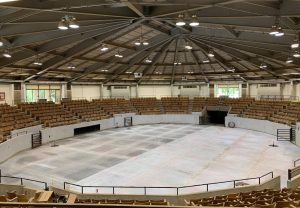As the University of Missouri prepares to open its doors for the 2020 fall semester, the MU College of Agriculture, Food and Natural Resources (CAFNR) has spent the past four months making sure the return for its faculty, staff and students will be done safely and according to the Show Me Renewal Plan.
An academic operations team comprising one individual from each of CAFNR’s six divisions, and led by Bryan Garton, senior associate dean and director of academic programs, worked nonstop on making sure CAFNR could host as many in-person classes as possible.
“This is an unprecedented time, not only for the University of Missouri but for colleges and universities across the globe,” Garton said. “I’m incredibly proud of our academic operations team and the work they did to prepare us for the upcoming academic year. Their willingness and ability to work together, with the students’ best interests in mind, was critical.”
The academic operations team included: Debbie Finke, associate professor, Division of Plant Sciences; Shari Freyermuth, associate teaching professor, Department of Biochemistry; Amy Moum, program/project support coordinator, Division of Applied Social Sciences; Leon Schumacher, professor, Division of Food Systems and Bioengineering; Trista Strauch, assistant teaching professor, Division of Animal Sciences; and Sonja A. Wilhelm Stanis, associate professor, School of Natural Resources. Laura Friedrich, senior student service coordinator in the CAFNR Office of Academic Programs, and James Hundle, assistant to the CAFNR vice chancellor and dean, also played critical roles in the process.
The group met three times a week to work through the guidelines and protocols in place due to the COVID-19 pandemic.
“We quickly learned that there were going to be numerous parameters for us to work through, especially as all of our classrooms will follow the proper social distancing protocols,” Garton said. “For example, Conservation Auditorium in the Anheuser-Busch Natural Resources Building typically seats 499 students. Given the six-foot parameters, that classroom can now only hold 66 students.”

Garton said the group began the process with finding space for CAFNR’s largest classes. The Trowbridge Livestock Arena, which was in the process of receiving numerous renovations, opened up a perfect opportunity. The renovations were in place to transform the arena into a future event center. Garton said funding for those renovations are coming from MU Extension and the CAFNR Foundation, among others.
“Trowbridge is an enormous space that is in good shape and is a great asset,” Garton said. “Once we began this process, we realized we could hold some sizable classes in that complex.”
There are two venues in Trowbridge, the first of which is a show arena. CAFNR had the show arena completely cleaned, replaced the dirt floor with concrete and added four huge fans. The second venue was a sales arena, which was already being utilized as a classroom by the Department of Biochemistry.
“The only additional change in our original plan was to add audio visual equipment,” Garton said. “We had already scheduled the other work to take place, through numerous donations. The timing was honestly perfect.”
While renovations are taking place to transform the space, the Trowbridge Event Center will continue to host livestock events as well. Rubber bedding will be used for those events, which can be cleaned and reused.
In the show arena section, a total of 200 students can be in the classroom socially distanced – 145 in the wooden arena seats and 55 in desktop chairs on the concrete floor. The sales arena section will now hold 120 students. The show arena already has a massive projection screen, and the sales arena is complete with projectors and two digital display monitors.
In addition to that space, two other venues are being converted to larger classrooms. Agricultural Engineering Building 135, which housed large machinery and hosted CAFNR staff during the annual luncheon, will accommodate 50 students. The space that was Eckles Café has now become a 35-seat classroom.
“Using Eckles Café as a classroom assures maximum usage by the students,” said Joe Parcell, director of the Division of Applied Social Sciences. “Operating a café with the need for enhanced safety requirements is cost prohibitive at this time. We will continue to evaluate the future use of the café space.”
Garton said the operations teams moved 27 classes to Trowbridge. Some of those classes are blended, which means they are a mixture of in-person and online learning opportunities. Trowbridge is also ADA compliant, as are the other new CAFNR classrooms.
“We worked really hard as a college to maximize the efficiency and use of our space,” Garton said. “Our first priority was large classes and our second priority was incoming freshmen. We wanted our first-time college students to have as many in-person learning experiences as possible.”
For laboratory space, Garton added that as long as students wear medical-grade masks, social distancing requirements are reduced to three feet. CAFNR will provide the students with those medical-grade masks, which will be stored in the laboratories.
“There are obviously going to be changes with our labs, but we’ve gone to great lengths to continue that experience,” Garton said. “For example, students will have to stay at their station and the chemicals, equipment and supplies will be at those stations. We’re also working through how we transport students to our off-campus laboratories, like our Agricultural Research Centers.”
CAFNR also ordered 300 face shields for instructors.
As far as entrances and exits, Garton said the group has designed a system where all entrances and exits have one-way flow. That information is available on MyCAFNR, along with diagrams of buildings in CAFNR’s control.
“While this semester is going to be much different for our students, faculty and staff, we’re excited to welcome everyone back to campus,” Garton said. “Our priority is to ensure the safety and health of everyone as they return to campus.”